SA’s biggest family-owned seafood businesses share their challenges and opportunities for 2022
Improving trade relationships and battling through the pandemic are major challenges facing the state’s fishing barons. We profile SA’s family-owned seafood icons.
SA News
Don't miss out on the headlines from SA News. Followed categories will be added to My News.
They’ve weathered Chinese trade blocks, pandemic-related restaurant closures and endless logistic challenges.
And the state’s seafood institutions say 2022 presents a suite of new hurdles and opportunities.
We profile some of the state’s biggest family-owned seafood producers.
Stehr Group
Better government diplomacy is needed to help revive trade links with China and resume rock lobster and tuna sales, fishing baron Hagen Stehr says.
“Regardless of what their political beliefs are, China is the biggest economy in the world and we’ve got to work with them,” he said.
“They’re rejecting our lobsters and tuna and taking them from other parts of the world. It will cost us deeply – millions and millions of dollars.”
Mr Stehr, founder of the Stehr Group, based in Port Lincoln, is not shy about speaking his mind.
In 2012, he threatened to sue the Gillard government over plans to allow oil exploration in the Great Australian Bight’s fishing grounds.
He also spoke out in 2021 amid uncertainty over the Australian Maritime and Fisheries Academy’s future at its TAFE SA-owned site in the Port.
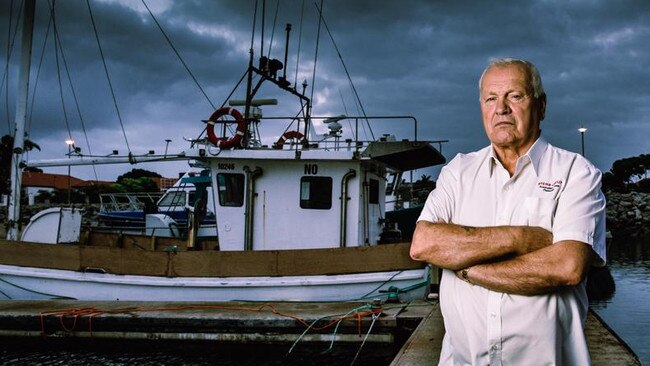
The Stehr family is synonymous with the southern bluefin tuna fishing game, not just in South Australia, but across the country.
Hagen’s son Marcus Stehr is managing director and a director of seafood supply company Clean Seas, and grandson Saxon also works at for the Stehr Group.
Wife Anna is a company director and daughter Yasmin Stehr is involved with a different form of aquatic activities.
Alongside Michael Dyer she owns Oceanic Victor, which runs the swim-in aquarium at Victor Harbor and The Island Cafe on Granite Island.
In 1997, Hagen set up the Australian Maritime and Fishing Academy at Port Adelaide.
The following year, he was named an Officer in the Order of Australia for his services to education and training.
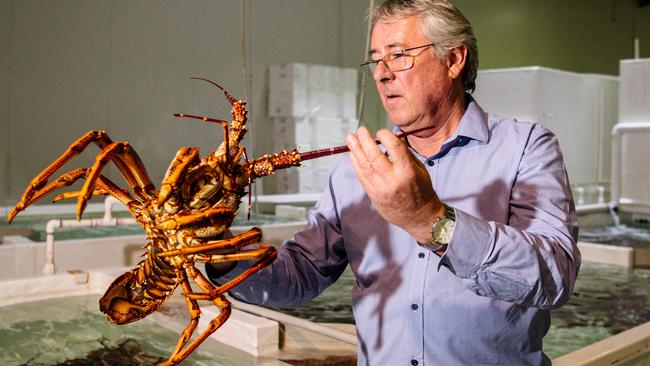
Ferguson Australia
Cheaper lobster prices are here to stay for the near future, Fergusons Australia says, in the wake of China closing the door on our exports.
Prices are sitting at about $70 to $80 per kg and managing director Andrew Ferguson said they were unlikely to rise soon, as the sector grappled with the task of filling the market gap left by China.
“Prices of Wagyu beef have caught up with lobster now and prawns aren’t far away – it’s not like it was before,” he said.
The pandemic was also hampering efforts to find other international markets.
Mr Ferguson said another major challenge for 2022 was dealing with customers’ uncertainty and hesitancy to spend time in shops and restaurants due to Covid.
But online sales were going strong and the business’s delivery service was at capacity in the lead up to Christmas, he said.
Andrew and wife Debra started Ferguson Australia, which employs about 75 staff.
The company has three factories – one in Adelaide, a second in Port MacDonnell and a third in Port Lincoln.
Mr Ferguson’s daughter Kate Birch is now “running the show” as the company’s general manager.
The family fishing legacy all started with Andrew’s father Robert Ferguson, who moved from farming to fishing in the South-East in 1969.
Robert’s focus on southern rock lobster still characterises the family business but Ferguson Australia also is known for its tuna and kingfish.
Eyre Peninsula Seafoods
The country’s largest producer of blue mussels was formed from a merger of Kinkawooka Mussels and Boston Bay Mussels.
Eyre Peninsula Seafoods executive director Andrew Puglisi and his father Bob formed Port Lincoln’s Kinkawooka Mussels in 2000 and the two businesses combined in 2016.
The company employs about 60 people.
Mr Puglisi says while 2021 has been a turbulent year for many, sales have still been strong.
“Mussels is a poor man’s seafood and it’s been a good year for us,” he said of 2021.
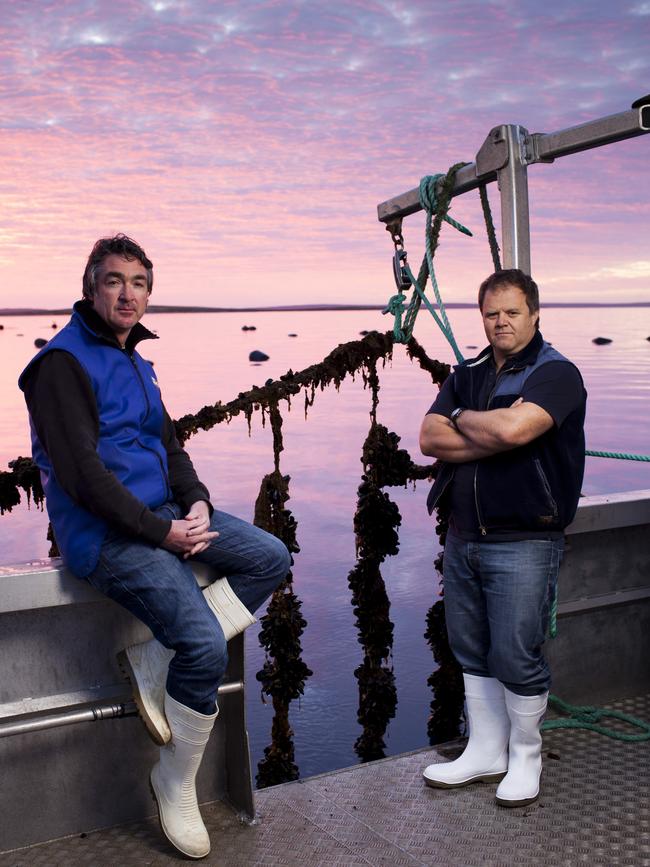
But it certainly hasn’t been all smooth sailing over the past 12 months. His company is leading a charge against SA Water’s plans to build a desalination plant at Billy Lights Point.
The business and many other locals are worried about potential environmental effects associated with hypersaline water from the plant being discharged into Boston and Proper bays.
The state government recently announced the project would be put on hold for a year, while it worked with SA Water to explore other potential sites for the project.
The plant will deliver water to people across the Eyre Peninsula.
“EP Seafoods are fully supportive of a desalination plant to supply freshwater to the peninsula but not at the cost of the industry, especially in the Boston Bay area,” Mr Puglisi said.
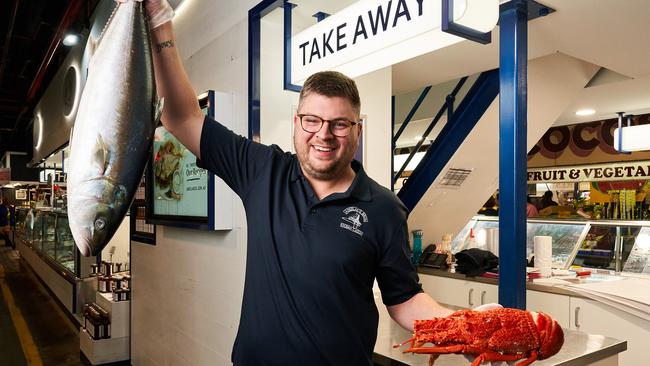
Angelakis Brothers
The roots of family history run deep in Angelakis Brothers, which in 2018 was bought out by the Knoll family, well known for its brand Barossa Fine Foods.
Michael George Angelakis came to Australia from the Greek island of Symi in the 1920s, using a borrowed dingy to fish waters in the Great Australian Bight off Thevenard.
His sons George and Nick and brother-in-law Sam Sperou founded Angelakis Bros.
Then the third generation, Tom and Michael N Angelakis, and Peter and Michael Sperou operated the company until 2018, when it was acquired by Barossa Fine Foods.
Spero Drikas – the grandson of one of the original brothers – is still working with the business looking after its dispatch area.
Barossa Fine Foods director Alex Knoll said the Angelakis family had focused on imported seafood but, since the takeover, that had shifted towards local produce.
“In the past 18 months we’ve gone away from the commodity market and put a larger focus on working with fishermen and the regions, to get supply into the Adelaide market,” he said.
“A lot of the seafood that gets caught in SA gets shipped off interstate.
“We’re working with fishermen to get better pricing so they don’t have to send it to Sydney and Melbourne to get the better prices.”
The business has shops at Central Market Arcade, Stirling Shopping Centre and Burnside Village.
In 2020, the Angelakis Bros seafood factory and offices moved in with Barossa Fine Foods at a new seafood processing address at Edinburgh North.
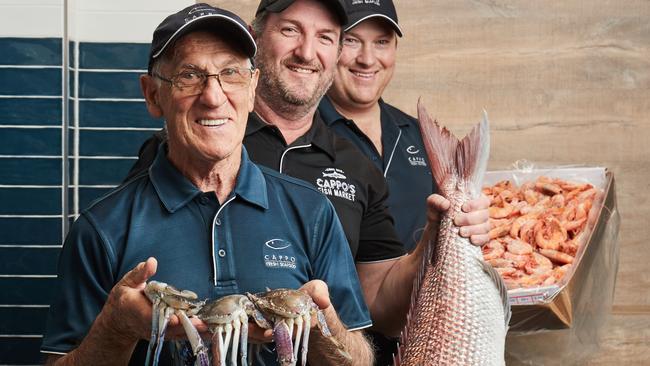
Thomas Cappo Seafoods
Attracting enough skilled workers and supply to meet demand are among the seafood sector’s biggest challenges in 2022, Damian Cappo says.
“South Australia has exceptional pedigree within the seafood industry with product
recognised locally and globally for its high quality,” he said.
“The demand for seafood is strong so one of the challenges in the year ahead will be around consistency of supply as the wild-caught fisheries are further rationalised with quota and licence buybacks.
“At the same time, attracting skilled workers remains an issue with a current shortage of fish filleters and oyster shuckers.”
However, Mr Cappo says as the state’s borders open up, so will the markets for South Australian produce.
The Cappo name is synonymous with seafood in SA and the family in 2017 teamed up with Thomas Foods to expand nationally and internationally.
Family members were early Italian migrants and a partnership of six brothers founded the Cappo Seafood business in 1919 at Port Pirie.
While the brothers were also involved in fishing in the early days, the business soon became more focused on seafood production and distribution.
Third generation brothers Damian and Matthew Cappo are now the co-directors of
Cappo Seafoods, taking over running of the business from their father Maurice.
Seafood is processed and packaged at Parkside. The business also has a retail shop at the Central Market, employing up to 20 staff at peak times.
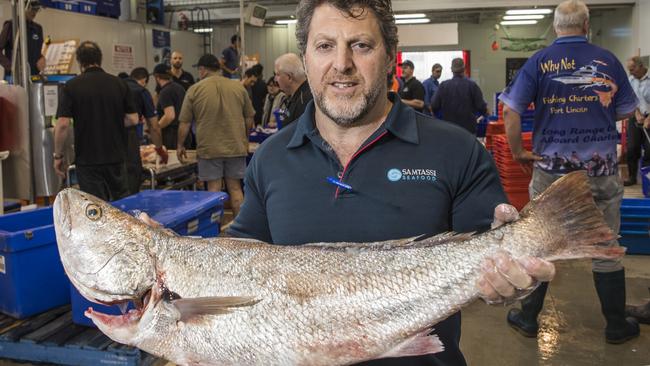
Samtass Brothers Seafoods
The Andonas family’s involvement in the seafood game dates back to 1936, when Tom Andonas, a migrant from Rhodes Island, Greece, began his involvement in the sector.
Beginning as a hawker, he would buy from local Port Adelaide fishermen and go door to door selling the fish, later selling wholesale to outlets in Adelaide.
Then in 1939 he went into partnership with his brother, opening a fish cafe in Adelaide and maintaining the wholesale business.
In 1942, he sold his share and opened a new fish cafe and retail shop, his sons Sam and Tass later joining him, and his grandsons Mark, Anthony and Michael.
It has moved several times and now has a factory and retail premises at Richmond Rd, Richmond, and a shop in the Central Market.
After the family helped grow exports of South Australian lobster, king prawns and orange roughy, in 1986, its focus turned towards the retail business.
These days, Samtass retails, wholesales and distributes more than 15,000kg of mainly fresh seafood each week.
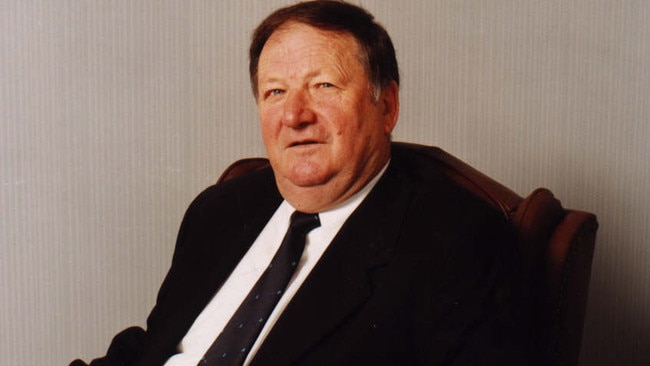
Australian Fishing Enterprises
The late tuna fishing baron Sime (Sam) Sarin established Australian Fishing Enterprises in 1987 and the enterprise has since grown to become one of Port Lincoln’s largest employers.
The Sarin Group now employs more than 200 people across areas including seafood, tourist accommodation and property development enterprises.
Sarin Group’s Australian Fishing Enterprises specialises in the fishing and ranching of southern bluefin tuna, and is the country’s largest exporter of the species, selling into the international premium sushi and sashimi market.
The company’s presence is felt far and wide on the Eyre Peninsula – it also operates the Port Lincoln Slipway, Sarin Property Group and the Port Lincoln Tourist Park.
Such is the Sarin family’s hold on the market, it holds almost half of the country’s southern bluefin tuna quota.
Sam set up the business after migrating to Australia from Croatia in the 1950s and has grown Australian Fishing Enterprises into one of the largest tuna ranching companies in the world.
In 2019, he was named a member in the general division of the Order of Australia for his service to the fishing industry, business and the Port Lincoln community.
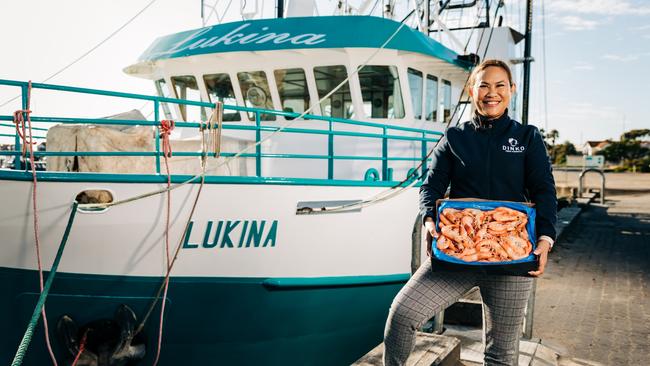
Dinko Seafoods
Farming for abalone in Elliston and harvesting seaweed are among new projects on the books for Port Lincoln-based Dinko Seafoods.
Dinko Lukin began tuna farming on the Eyre Peninsula in 1966.
And in the face of government restrictions to address overfishing of southern bluefin tuna in the 1980s, he hatched the idea of farming the species.
Live fish were harvested as they passed through cold South Australian waters in late summer.
A select number are transferred to a net and slowly towed back to Port Lincoln where they are ranched and fed a diet of pilchards, sardines and yellow tail.
The method effectively doubled the fishermen’s quota because their catch limit is determined by the weight of the fish caught in the wild.
Dinko Tuna also fishes for western king prawns and Australian sardines.
When Dinko died in July 2011, his wife Lukina Lukin continued the company’s operations as managing director.
She says plans to farm for abalone in Elliston and also to harvest seaweed from its existing operations, are among new opportunities the business will explore in 2022.
The seaweed project is a collaboration with the Marine Bioproducts Cooperative Research Centre and involves turning the plant into fertiliser.
But Mrs Lukin said the pandemic also would present significant challenges this year, amid logistic hurdles and worries about potential outbreaks grounding fishing crews.
In 2019, she invested in a liquid nitrogen freezing and tuna processing facility the company’s Port Lincoln factory, allowing it to freeze fish down to -60C in 45 minutes.
The business employs 13 full-time staff and up to 60 people at peak times.
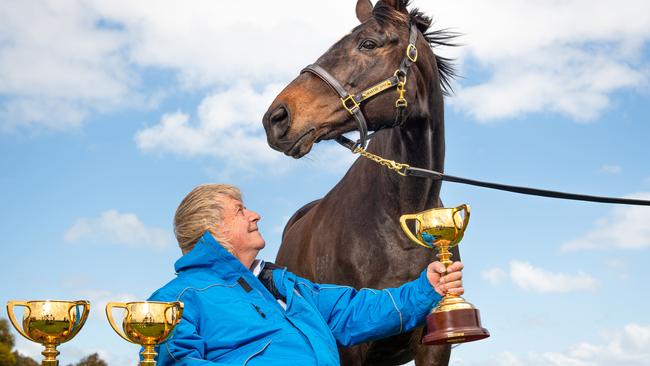
Tony’s Tuna International
Tony Santic’s name isn’t just well known in Port Lincoln because of his fishing empire.
A statue of his horse Makybe Diva watches over the town’s foreshore after she won three consecutive Melbourne Cups in 2003, 2004 and 2005.
The tuna industry pioneer set up Tony’s Tuna International in 1994, after he began fishing for the species in 1970.
In 1992, the business began ranching tuna and is now the second largest southern bluefin tuna ranch in the country, supplying fish for the sashimi market.
In 2016, he also made an impact in Victor Harbor, when as a director of Oceanic Victor, he won government approval to build an in-sea aquarium near Granite Island – much to the frustration of some locals who thought it would attract sharks to the area.
With friend and business partner Ron Forster, who owns Calypso Star Charters, Mr Santic also funded research into why some tuna were dying off, leading to the discovery of a new disease.
In 2012, Mr Santic’s former accountant was jailed for stealing $700,000 from his racing and breeding operation, based in Victoria.
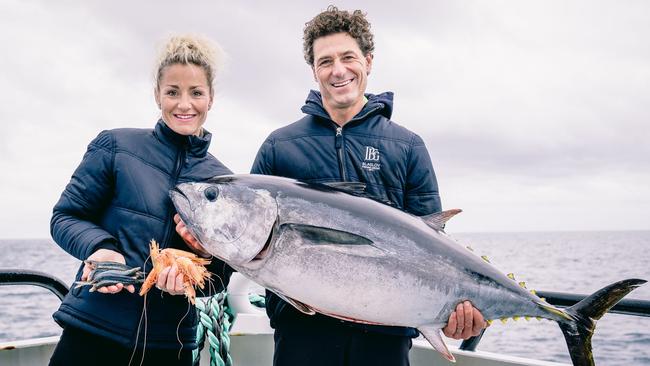
Blaslov Fishing Group
Croatia is strongly represented in Port Lincoln’s fishing fraternity with the Blaslov name also deeply rooted in the Eyre Peninsula’s maritime scene.
It all started with Anton and Grozdana Blaslov, who left Croatia in 1957 in search of better opportunities, settling in Geelong and later moving to Port Lincoln.
Forming Blaslov Fishing, Anton fished for tuna and prawns, with his daughters Sandy Maria Scharfe and Nansi Blaslov-Nelligan now carrying on his legacy as directors of the company and its subsidiaries. Both have children also working in the business.
Last year, Blaslov partnered with Dinko Seafood and the Stehr Group to offer their premium seafood direct to consumers in a joint venture aimed at boosting domestic sales.
KIN Premium Australian Seafood sells premium cuts of southern bluefin tuna.
The families hoped KIN would help re-energise the local industry after huge challenges brought by disruption to premium seafood markets caused by the pandemic.
Originally published as SA’s biggest family-owned seafood businesses share their challenges and opportunities for 2022





